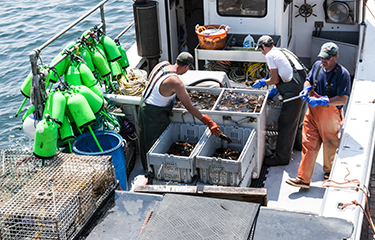The U.S. lobster fishery and the National Marine Fishery Service has gained another two years to work on a new set of regulations that better take the protection and preservation of North Atlantic right whales into account, in a ruling issued on an ongoing lawsuit from U.S. District Judge James Boasberg.
The lawsuit, Center for Biological Diversity v. Raimondo, was the source of a July 2022 ruling that found new NMFS regulations did not meet the standards required for the fishery to remain legal under the Marine Mammal Protection Act and the Endangered Species Act. Fishery representatives and regulators have been grappling on interpretations of the new rules, which were intended to protect the critically endangered North Atlantic right whale.
Boasberg’s latest decision, issued Friday, 18 November, has given the lobster fishery and NMFS more time to finalize a new large whale take reduction plan, with a revised due date of 9 December, 2024. In the remedy, Boasberg called his decision to remand the NFMS’s final rule “without vacatur” (vacating) the entire rule “the easy part,” as both the Center for Biological Diversity and the NMFS and lobstermen are “largely on the same page.”
However, Boasberg had a more difficult time deciding whether to vacate the biological opinion outlining the lobster fisheries’ impact on right whales.
“The second factor, however, tilts the other way because of the considerable hardship such an order would inflict on the lobster industry and the states of Maine and Massachusetts,” Boasberg wrote in the decision.
The NMFS was proposing that the opinion be remanded without vacatur, and for the court to wait until 2030, while the environmental nonprofit Center for Biological Diversity advocated having the biological opinion remanded with vacatur, but with a stay of two years.
Instead, Boasberg chose a third option – to remand the biological opinion but hold the vacatur decision in abeyance.
“This decision is the wisest course because facts on the ground are shifting rapidly, as new data emerge on right-whale migratory patterns, mortality factors, technological change, and more,” Boasberg wrote. “The court believes it prudent to wait for as much information as possible before making a vacatur decision in this consequential matter.”
The court will now wait until after the rule is due in December 2024 to check back with both parties in the lawsuit, and will then determine whether or not the biological opinion should be vacated, and on what timeframe.
“The court’s approach will allow the federal lobster fishery some stability to keep operating, while all stakeholders continue their shared work of implementing corrective measures to secure the future of the right whale in the long term,” Boasberg wrote. “As it once again articulated in last week’s hearing, the court’s goal in this process remains to allow all stakeholders – conservationists, scientists, lobstermen, and others – to work collaboratively to ensure the survival of both the right whale and the lobster industry.”
Maine Lobstermen’s Association Executive Director Patrice McCarron said the decision “offers lobstermen some hope,” but that the current course will still be damaging to the fishery.
“We appreciate that the judge recognizes the need to avoid massive disruption of the fishery, but the simple truth is lobstermen are still mandated to achieve a 90 percent risk reduction in two years, which cannot happen without causing significant harm to the fishery,” McCarron said. "This is why the MLA's lawsuit against NMFS is so critical. We must continue our fight through the appeals court to force NMFS to reconsider its worst-case assumptions so that the risk-reduction goal will be recalculated to more closely reflect the risk posed by our fishery.”
The MLA recently filed its opening brief in an appeal of the federal regulations, and plans to continue fighting the requirements as they stand.
"The bottom line is the court’s decision provides us some additional time to ensure that a final whale plan is based on the best available science and commercial data, but not enough time to help recover right whales without needlessly sacrificing the Maine lobster fishery,” McCarron said.
Photo courtesy of WoodysPhotos/Shutterstock







